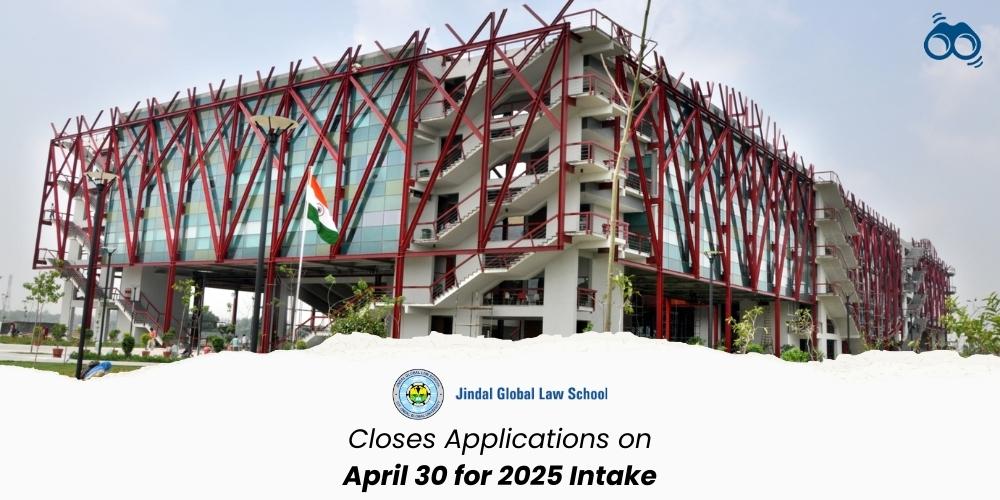Applications Close on April 30: Last Chance to Join India’s Leading Law School
JGLS Reinforces Leadership with Top QS Global Ranking for Sixth Consecutive Year
Jindal Global Law School (JGLS), a part of OP Jindal Global University (JGU), announced that applications for its esteemed five-year Law programmes will close on 30 April 2025. Prospective students are required to complete the LNAT-UK test before this deadline. This announcement coincided with JGLS’s recognition as India’s No. 1 Law School in the QS World Universities Rankings by Subject Law 2025, a title it has impressively held for six consecutive years. Additionally, JGLS achieved a commendable global ranking of 78th, further cementing its reputation. The parent university, JGU, recently celebrated its 15th anniversary, marking the occasion with the launch of India’s first Constitution Museum on its campus. This unique initiative has positioned JGLS as the only law school globally to house such a museum, reinforcing its dedication to preserving legal history and promoting legal education. The university has also been recognised as an Institution of Eminence (IOE) by the Government of India, underscoring its unwavering commitment to academic excellence.
Professor (Dr.) C. Raj Kumar, Founding Vice Chancellor and Dean of JGLS, expressed strong support for the LNAT Test as an admissions tool, emphasising its success. He noted that the LNAT, administered by the Oxford-based LNAT Consortium, evaluates reading comprehension and logical reasoning skills without including questions on law or general knowledge. He further highlighted that its seamless global administration ensures a fair and competitive process for applicants.
Professor Anand Prakash Mishra, Vice Dean of JGLS, revealed that 75% of seats in the five-year LLB Hons programmes were already filled through the Early Admission Process, which concluded on 31 January 2025. He confirmed that the remaining 25% of seats, accommodating 225 students, will be filled based on LNAT scores by the 30 April deadline. He also noted that this represents the final chance for students to secure admission for the academic year beginning 1 August 2025.
The LNAT-UK, the National Admission Test for Law, is widely accepted by top law schools such as Oxford, Cambridge, and LSE. JGLS, the only Indian law school in the LNAT Consortium, offers this test free of charge for admitted students. It is a 95-minute Computer-Based Test (CBT) consisting of 42 multiple-choice questions spread across 12 passages. The test, accessible at over 500 centres worldwide, including 40+ in India, does not require essay writing. The cutoff score, which was 15 out of 42 during early admissions, may vary in subsequent cycles, and full question papers are available for download on the LNAT-UK website.
LNAT-UK scores will also be considered for more than 300 merit-cum-means scholarships at JGLS. These scholarships, covering 10% to 75% of tuition fees, are awarded based on academic merit and parental income (under INR 50 lakhs). The 120 GBP LNAT Test fee is waived and adjusted against the first-year tuition fee for admitted candidates. These initiatives reflect JGLS's commitment to providing outstanding opportunities for legal education and ensuring access to deserving students worldwide.
Editor's Note:
The efforts undertaken by Jindal Global Law School (JGLS) exemplify a commitment to elevating legal education in India while fostering global standards. By incorporating the LNAT-UK test, JGLS sets a benchmark in admissions, embracing a standardised and globally recognised system that ensures fairness and merit-based selection. This approach reflects an admirable dedication to nurturing future legal minds equipped to tackle contemporary challenges. Moreover, the institution's investment in initiatives like the Constitution Museum adds depth to its academic ethos, emphasising the importance of history and innovation in shaping the future of law. However, what truly stands out is JGLS's proactive measures to ensure accessibility for students through scholarships based on merit and parental income. In a country where quality education is often hindered by financial barriers, this model of support should serve as a blueprint for other institutions. According to
Skoobuzz, JGLS sets a precedent for holistic legal education and reaffirms the idea that knowledge should be inclusive and transformative.














0 Comments (Please Login To Continue)